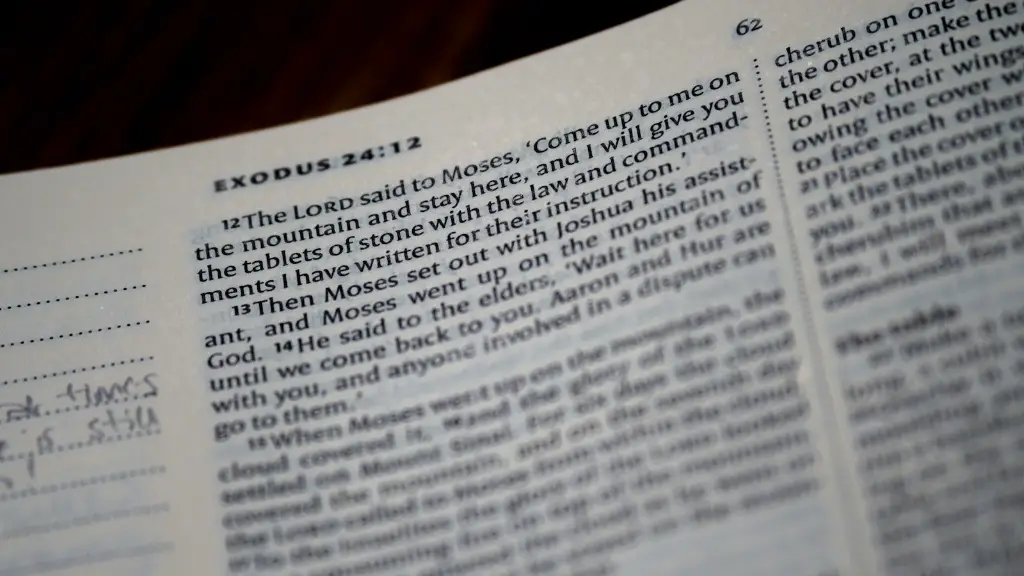Moses in the Bible
Moses is an important character in the Bible and is found in the Old Testament. He was an Israelite prophet and played a major role in leading the people of Israel out of slavery in Egypt. He was the one who received the law of God, the Ten Commandments, for his people. He is sometimes referred to as “the lawgiver.” He is also called by God to lead the Israelites on their journey through the wilderness and to the promised land.
The account of Moses’ life is found in the Bible in the books of Exodus and Deuteronomy, mainly in the Pentateuch, the first five books of the Old Testament. As a leader, Moses was a true man of God, fearless in his devotion to God and reverence for His Word. He truly loved God and put God’s covenant with Israel at the forefront of his life.
His life begins with his birth and infancy. His mother put him in a basket and set him afloat on the Nile River, and then he was adopted by Pharaoh’s daughter. He was then brought up in Pharaoh’s house, and studied all the wisdom of Egypt. Pharaoh’s daughter called him Moses, which means “son of God.”
Moses’ faith in God is evident throughout the Bible, as he constantly seeks out God’s direction for his life, despite the consequences. He was willing to face danger for God’s people and demanded justice for their sake. He was humble in accepting God’s authority and obediently followed God’s will despite personal risks.
After the death of Pharaoh, Moses fled to Midian in the Sinai wilderness where he married and had two sons. Here he spent forty years in the desert, and then at the age of eighty-two he was called by God to lead the Israelite people out of Egypt.God gave Moses the ten commandments on Mount Sinai and sent him to deliver the Israelites out of slavery into the promised land.
Throughout his life, Moses was known as a man of honor and justice. He stood up for God’s people, was kind and humble, and always kept God’s law. He was a strong leader, wise teacher, and faithful prophet, and is remembered as one of the most important figures in the Bible.
The Ten Commandments
The Ten Commandments are the core of Jewish and Christian religious doctrines.These are a set of guidelines outlining the rules for moral behavior, and also instructions for how to properly worship God. The commandments were given to Moses by God on Mount Sinai, and God told him to write them down on tablets of stone.
The Ten Commandments are divided into two categories: the first four commandments concern religious beliefs and behavior towards God, and the remaining six concern ethical and moral behavior towards other human beings. The Ten Commandments serve as a powerful symbol of the covenant between God and humankind. For more than three thousand years,they have provided a foundation for both Jewish and Christian faiths.
Most Christians believe that the Ten Commandments are timeless and universal, while others argue they are primarily significant to the ancient Israelites. They argue that much of the meaning of the Ten Commandments applies to any culture or society, while some of the rules are applicable only to the ancient society in which they were written.
In the modern era, the debate over the relevance of the Ten Commandments continues. Many argue that the ethical principles stated in the Ten Commandments should be adhered to, while others argue that the laws are merely a product of their era, and therefore out-dated and unnecessary. Whatever the interpretation, most agree that the Ten Commandments still provide an invaluable moral compass for believers and non-believers alike.
Moses in Judaism and Christianity
The Bible contains a number of stories about Moses, ranging from his birth to his death, and his accomplishments in between. As the central figure in the Bible’s account of liberation from Egypt and the journey to the promised land of Canaan, he has been revered by both Jews and Christians alike.
Jews view Moses as a great leader, prophet, and teacher. He is remembered as having been given the Law at Mount Sinai and then setting out on the journey to the promised land with the people of Israel. He is seen as a source of wisdom, guidance, and the ultimate teacher. As the founder of the Jewish religion, he is the most revered figure in Judaism.
Christians also consider Moses as a great teacher, leader, and prophet. Although he is viewed as having been given the Law, he is also seen as having been superseded by Jesus, who Christians believe to be the ultimate moral teacher. Jesus is believed to have fulfilled Moses’ Code, fulfilling the Law for all time. Moses is revered for leading the Israelites out of Egypt, miraculously parting the Red Sea, and introducing the Ten Commandments.
Moses has been an important figure in both Judaism and Christianity throughout history. He is seen as a prophet, leader, lawgiver, and moral teacher, and he is remembered as the one who brought the Israelites out of slavery and into the promised land.
Theories About the Historicity of Moses
The historicity of Moses, or the facts about his life, is a matter of debate, especially in the modern era. Some historians and archaeologists argue that the events described regarding Moses, such as his leading the people of Israel out of Egypt and receiving the law on Mount Sinai, are unlikely to have happened as described and therefore must not be taken literally.
A prominent scenario suggested by some researchers is that the exodus of the Hebrews from Egypt was a mass migration that possibly happened much earlier than the date given in the Bible, and that Moses was likely an invented figure or a composite of numerous leaders, prophets, and heroes of the Middle East at that time. There is also speculation that some of the stories about Moses were adapted and changed to fit the political and ideological agendas of different religious sects at the time.
Other scholars, however, argue that the traditional view of Moses is generally accepted as an historical figure, with some question as to which parts of his story are literal and which may be more symbolic. While it is undeniably difficult to prove the historicity of Moses, he is nonetheless an iconic figure that has had a profound effect on Jewish and Christian traditions.
The Significance of Moses in Modern Times
In modern times, Moses is still seen as a symbol of justice, integrity and courage. He is remembered for his leadership, strength, and wisdom in leading the Israelites out of slavery in Egypt and fulfilling God’s covenant with them. He is also remembered for receiving the Ten Commandments and for his unwavering devotion to God, even in moments of fear and doubt.
Most importantly, Moses’ example of faith, courage, and devotion has served as an example of morality and righteousness to believers and non-believers alike. He is remembered as an iconic historical figure in both Judaism and Christianity, and his life and teachings are still studied today.
Moses’ legacy still resonates in the 21st century. His story has been adapted for countless books, movies, and plays. He is remembered as the ultimate symbol of justice and faith, and his example of courage and devotion are still an inspiration to those who strive to do the right thing and follow their convictions.
The Role of Miracles in the Moses Story
The story of Moses also contains several powerful miracles. Most notably, there is the miracle of the parting of the Red Sea, as well as the plagues of Egypt sent by God to demonstrate his power. These miracles are sometimes seen as evidence of God’s will and his ability to accomplish extraordinary things with his people.
These miracles are also seen as evidence of the power and scope of God’s plan. Miracles can be seen as the ultimate demonstration of God’s power and his ability to transcend even the laws of nature in order to accomplish his divine plan.
The miracles in Moses’ story have become iconic symbols of God’s power and ability to transform the seemingly impossible. They remind us that when God is on our side, we can accomplish extraordinary things in our lives and make a difference in the world.
The Aftermath of the Story of Moses
After his death, the people of Israel entered the promised land and formed a nation with God’s guidance. During this time, Moses is credited with introducing the law to his people, as well as providing guidance, protection, and leadership. He also wrote the first five books of the Bible.
The story of Moses has had a lasting impact on the history of the Israelites, and his legacy continues today. He is known as the great liberator and lawgiver, and his legacy has been passed down through countless generations in both Judaism and Christianity. His story serves as an example of courage, justice, and faith in the face of adversity.
Moses’ story is seen as a reminder that God is capable of great things. He is viewed as a symbol of hope and faith, as well as an example of moral excellence. He is remembered for his courage and devotion in the face of overwhelming odds.
Conclusion
Moses is a central figure in the Bible who is found in the Old Testament. He is known as the great liberator and lawgiver, and he is revered by both Jews and Christians as a symbol of justice, courage, and devotion. He fiercely defended God’s covenant with the Israelites and is remembered for leading them out of slavery into the promised land. He is also remembered for receiving the Ten Commandments, and for his wise teachings that have had a lasting impact on both Judaism and Christianity.





